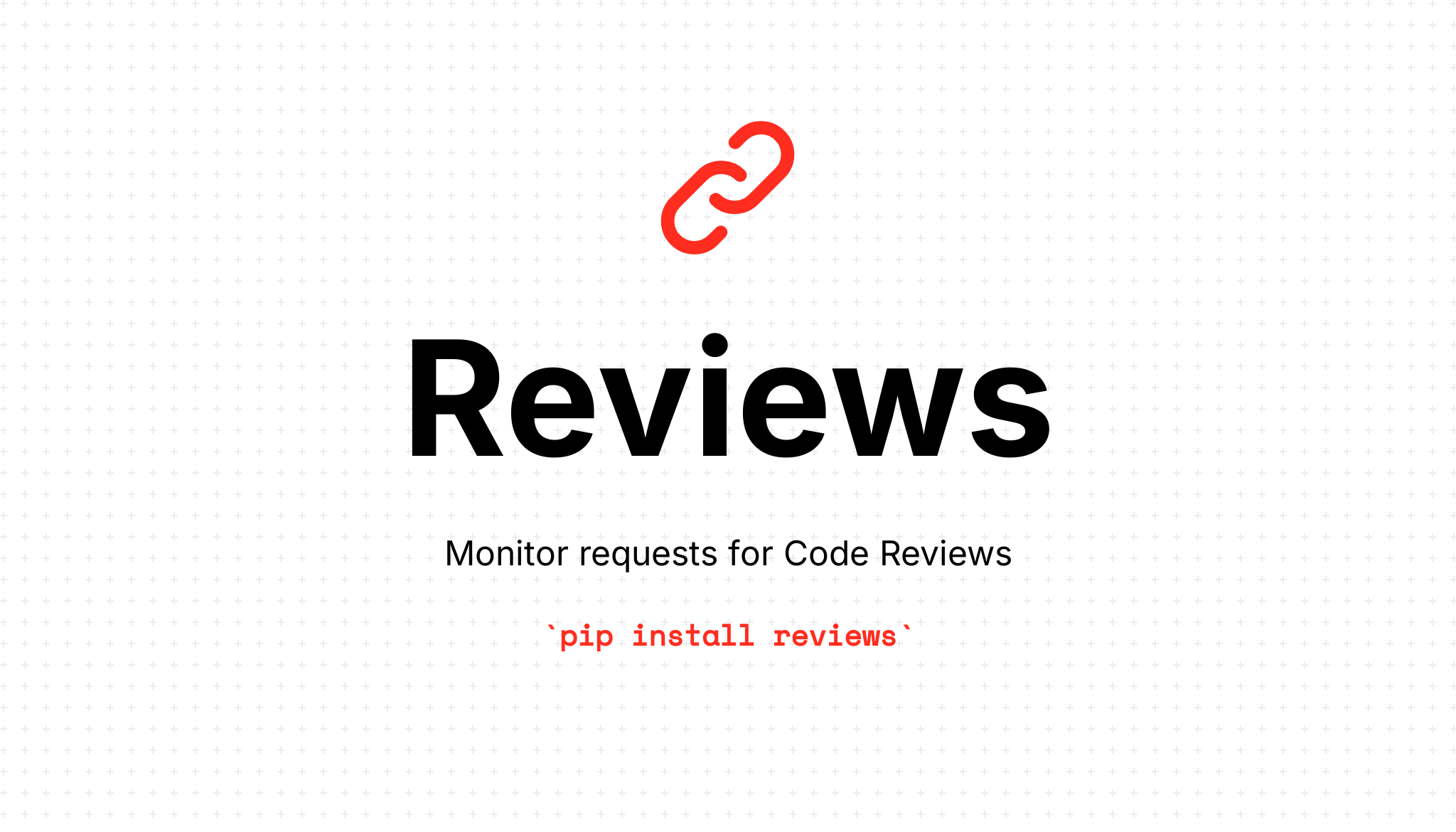https://github.com/apoclyps/reviews
A terminal UI dashboard to monitor requests for code review across Github and Gitlab repositories.
https://github.com/apoclyps/reviews
code-review developer-experience hacktoberfest python tui workflow
Last synced: 9 months ago
JSON representation
A terminal UI dashboard to monitor requests for code review across Github and Gitlab repositories.
- Host: GitHub
- URL: https://github.com/apoclyps/reviews
- Owner: apoclyps
- License: mit
- Created: 2021-02-26T16:51:52.000Z (almost 5 years ago)
- Default Branch: main
- Last Pushed: 2025-05-01T08:32:02.000Z (10 months ago)
- Last Synced: 2025-05-12T13:53:35.298Z (9 months ago)
- Topics: code-review, developer-experience, hacktoberfest, python, tui, workflow
- Language: Python
- Homepage: https://pypi.org/project/reviews/
- Size: 1.46 MB
- Stars: 176
- Watchers: 2
- Forks: 12
- Open Issues: 12
-
Metadata Files:
- Readme: README.md
- Contributing: CONTRIBUTING.md
- Funding: .github/FUNDING.yml
- License: LICENSE.md
- Code of conduct: CODE_OF_CONDUCT.md
- Codeowners: .github/CODEOWNERS
Awesome Lists containing this project
README
# Reviews
[](https://github.com/apoclyps/reviews/actions/workflows/test.yml)



Simplify requests for code review with an all-in-one TUI dashboard providing an overview of open PRs requiring review!
### Quick Start
If you want to get up and running with Reviews, you will first first need to create a personal access token. To [create a Personal Access Token](https://github.com/settings/tokens) with the required permissions for reviews, you can `generate a new token (classic)` and enable the following full scopes for the following:
- `repo`
- `admin:org`
> Note: Whilst reviews only requires read only access, providing only `public_repo` and `read:org` permissions is insufficent as it does encompass all types of read-only access for repositories.
To start using reviews, you can run the following:
```bash
export GITHUB_USER="your-github-username"
export GITHUB_TOKEN="your personal GitHub token used for interacting with the API"
export REVIEWS_GITHUB_REPOSITORY_CONFIGURATION="apoclyps/reviews"
pip install --upgrade reviews
reviews config --show
reviews dashboard
```
[](https://asciinema.org/a/414444)
### Additional Support
#### View Configuration
If you wish to view the configuration used by reviews at any time, you can use the following command to show all configuration (with secrets hidden or shown):
```bash
reviews config --hide
reviews config --show
```
#### Gitlab
If you wish to use `reviews` with Gitlab, you will need to specify the configuration like so: `product id:project name/repository` and use the `--provider=gitlab` flag when running `reviews`:
```bash
export GITLAB_USER=user
export GITLAB_TOKEN=token
export REVIEWS_GITLAB_REPOSITORY_CONFIGURATION="27629846:apoclyps/reviews"
reviews dashboard --provider=gitlab
```
### Getting started with local development
To build and run the CLI on your host, you will need Python 3.9, pip, and virtualenv to build and run `review`.
If you wish to publish a PR with your changes, first create a fork on Github and clone that code.
```bash
$ gh repo clone apoclyps/reviews
$ cd reviews
$ python3 -m venv env
$ source env/bin/activate
(env)$ pip install -r requirements_dev.txt
(env)$ pip install -r requirements.txt
(env)$ python -m reviews dashboard
```
If you wish to keep a copy of Reviews on your host system, you can install and run it using:
```bash
$ export REVIEWS_GITHUB_REPOSITORY_CONFIGURATION="apoclyps/reviews"
$ python -m venv env
$ source env/bin/activate
$ python -m pip install -e .
$ reviews -h
```
You can run the Reviews within Docker:
```bash
docker-compose build cli && docker-compose run --rm cli python -m reviews dashboard
```
To build an image and run that image with all of the necessary dependencies using the following commands:
```bash
$ docker-compose build cli
$ docker-compose run --rm cli python -m reviews dashboard
```
For instructions on setting up a development environment outside of Docker, check out the [wiki](https://github.com/apoclyps/reviews/wiki/Development-Enviromnent).
### Configuration
Reviews supports both .ini and .env files. Reviews always searches for configuration in this order:
- Environment variables;
- Repository: ini or .env file;
- Configuration Path
- Review Defaults
The following steps are used to provide the configuration using a `.env` or `.ini` file. The configuration can be read from within the module/repository (default location set by decouple) using the `.env` file or via a location specified by an environmental variable that points to a `.ini` file located in the root of the project or in a location specified by `PATH_TO_CONFIG`.
#### Using an `.env` file within the repository
```bash
cd /home//workspace/apoclyps/reviews
touch .env
echo "REVIEWS_REPOSITORY_CONFIGURATION=apoclyps/micropython-by-example" >> .env
python -m reviews config
```
#### Using an `.ini` file within the repository
```bash
cd /home//workspace/apoclyps/reviews
touch settings.ini
echo "[settings]\nREVIEWS_REPOSITORY_CONFIGURATION=apoclyps/micropython-by-example" >> settings.ini
python -m reviews config
```
#### Providing a configuration path
If you wish to set the configuration path to use an `ini` or `.env` file when running the application, you can use the configuration of a specific file by supplying the path to the configuration like so:
```bash
cd /home/apoclyps/
touch settings.ini
echo "[settings]\nREVIEWS_REPOSITORY_CONFIGURATION=apoclyps/micropython-by-example" >> settings.ini
cd /home//workspace/apoclyps/reviews
export REVIEWS_PATH_TO_CONFIG=/home//
python -m reviews config
```
If at any time, you want to confirm your configuration reflects the file you have provided, you can use `reviews config` to view what current configuration of Reviews.
### Testing
A test suite has been included to ensure Reviews functions correctly.
To run the entire test suite with verbose output, run the following:
```bash
$ pytest -vvv
```
Alternatively, to run a single set of tests.
```bash
$ pytest -vvv tests/test_config.py
```
All tests can be run within docker by using the following command:
```bash
$ docker-compose build pytest && docker-compose run --rm pytest
```
### Linting
To run individual linting steps:
```
docker-compose build test
docker-compose run --rm --no-deps test isort .
docker-compose run --rm --no-deps test black --line-length 119 --check .
docker-compose run --rm --no-deps test mypy .
docker-compose run --rm --no-deps test flake8 .
docker-compose run --rm --no-deps test pylint --rcfile=.pylintrc reviews
docker-compose run --rm --no-deps test bandit reviews
docker-compose run --rm --no-deps test vulture --min-confidence 90 reviews
docker-compose run --rm --no-deps test codespell reviews
docker-compose run --rm --no-deps test find . -name '*.py' -exec pyupgrade {} +
```
You can also set up `pre-commit` to run the linting steps automatically during the commit phase,
the pre-commit pipeline can be set up by running the following command on the project root:
```bash
pre-commit install
```
### Contributions
Please read [CONTRIBUTING.md](CONTRIBUTING.md) for details on our code of conduct, and the process for submitting pull requests to us.